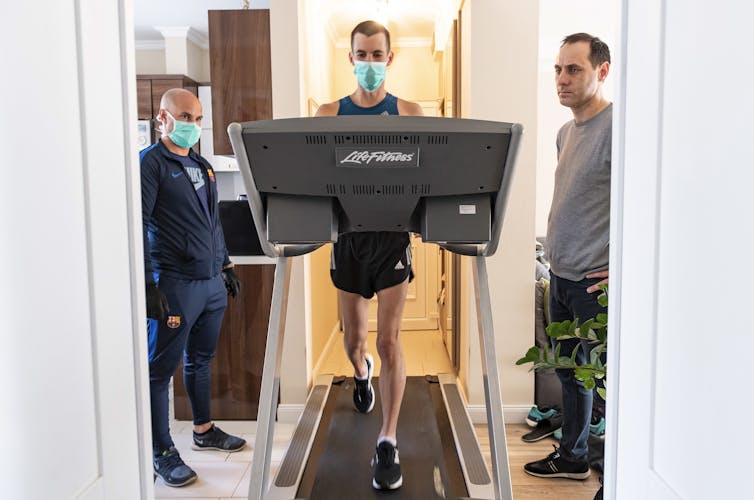In Ingmar Bergman’s The Seventh Seal, as plague claims half of Europe, a knight challenges Death to a game of chess to save himself and his friends. What follows is a celebration of the precious human life embodied in all of us.
In these perilous times, little plagues have lodged in our minds. Fear feeds on a dodgy social media. Millions of the poor are quarantined in neediness. From ringing bells to tapping pans, lighting candles to clapping hands, watching the Ramayana to setting up virtual conversations with loved ones, we need to calm our nerves.
What are the white knights of world sport doing? Pore through the Internet, switch on the television and enjoy retro sports and replays. Even chess, the most contemplative of sports, has gone virtual. Saina Nehwal’s last hurrah in the Olympics is doubtful. Hockey player Gurjit Kaur calls the crisis a blessing in disguise. Really?
We see little Olympic sports where India has had success: hockey, shooting, boxing, wrestling, and weight lifting. So, fasten on to Star Sports’ rewind of Pakistan’s 0-7 World Cup defeats to India. Watching our pantomime warriors, we might be forgiven for thinking of the real ones, conducting raids across frontiers and aerial strikes against a sneaky enemy.
Television is orphaned of live sport. We get insomniac watching our beloved stars underperform in legacy tournaments. Who cares about the real stars – health workers, law enforcement officials, ordinary citizens – who are proving yet again that India works better in a crisis than in normal times?
Questions are swirling around in sport. Will athletes accept voluntary pay cuts? Will the ICC be chastened by nature’s revenge on its pleasure alleys? Will sports figures speak up about our abuse of Mother Nature? Doubtful.
Diminished Britain sulks at loss of cricketing privilege, so Michael Atherton called the IPL disruptive. But human greed is inexhaustible. As India took charge, England and Australia scrambled to late fence- mending to stay in the game.
Why would anybody want the IPL to lose its allure? Why would the BCCI start a real conversation with a world in lockdown? Global climbers do not step down voluntarily. But what will BCCI do with its wealth? We hear little about philanthropic instincts.

A policeman walks past a logo of the Board of Control for Cricket in India (BCCI) during a governing council meeting of the Indian Premier League (IPL) at BCCI headquarters in Mumbai April 26, 2010. Credit: Arko Datta/Reuters/Files
Elsewhere, things may be better. The Players Association announced England’s centrally-contracted male cricketers will donate $613,000 to the England Cricket Board and charities. The women’s team has taken a three months’ voluntary pay cut. Teams in football’s Premier League will provide an advance of $153 million to the Football League and National League sides.
The crisis has knocked the life out of sport. Wimbledon has been cancelled, a first since World War II. Scores of tournaments – the World Athletics Indoor Championship; the Olympic boxing qualifiers; field hockey leagues in England, the Netherlands, Germany and Spain; the hockey Pro League; the Azlan Shah Cup; the Hockey Women’s Asian Champions Trophy and football’s Asian Champions League – have been abandoned or postponed.
Postponement of the Tokyo Olympics could impact between 0.5-0.8% of Japan’s GDP, according to the research firm Fitch. Postponement of Euro 2020 will cost Euros 250-300 million.
With events gone or deferred, we are back to training. For some time we heard brave, morale-boosting words from athletes about remaining fit. No more. Sportspersons struggle to make the virtual look real: doing routines like robots doing theirs in a quarantined piece of real estate on a celestial body.
In fairness, we can’t blame athletes for lacking motivation to push hard. How can we train at home, without the trainer and support team? Starved of games (no team likes the long tour Down Under), Australian hockey has turned its drills into art, winning everything. Alas, India lacks the tacticians who might replicate such routines.
The one tactician available is the state. A crisis is the state’s moment. It is the lifeline for both sages and self-servers. We are expected to exercise voluntary restraint on excesses. The state is watching.
Abhinav Bindra titled a chapter of his autobiography “Mr. Indian Official, Thanks for Nothing”. Lately, sport in India has had forward movement because the state has loosened controls. Are we back to the age of meddlesome governments?
Elite athletes in India now get paid. Stars can fall by the wayside, paralyzed by the lockdown. But in Indian sport, athletes don’t pay to play. Sport is a means to land a job in the government. Welfare is fashionable. If there were pay cuts, how would sportspersons respond?
Athletes can be immersed in their day jobs, from home. But since they are primarily players, how will they maintain motivation and morale in the uncertainty of the calendar?
This has raised issues of mental health. The postponement of the Olympics is “a step too far,” says retired British Olympic rowing gold medallist Tom Ransley. Losing nerve, elite badminton players have criticized the BWF for putting players’ lives at risk by going ahead with the All England Championships, drawing a sharp rejoinder.
So, it is doubtful that bonding in sport will deepen. How many of us have offered comfort to sportspersons who may be in depression, thinking about the wasted years of training? Far from breaking social barriers, the crisis actually reinforces them. Elite sports coronate high achievers from India’s despairing hinterland, giving them a social lifeline. Yet, we just don’t talk to athletes in India, it is not us. The rich simply sit on their perch.
We need earnest reasoning to heal our way out of the crisis. This means going back to the basics: the schoolboy joy of a 100-metre run, or Usain Bolt’s trademark celebration after winning Olympic gold.
Jitendra Nath Misra is a former ambassador and, until recently, was the advisor to the government of Odisha on sports.




